You Got Black Jack Do It Again
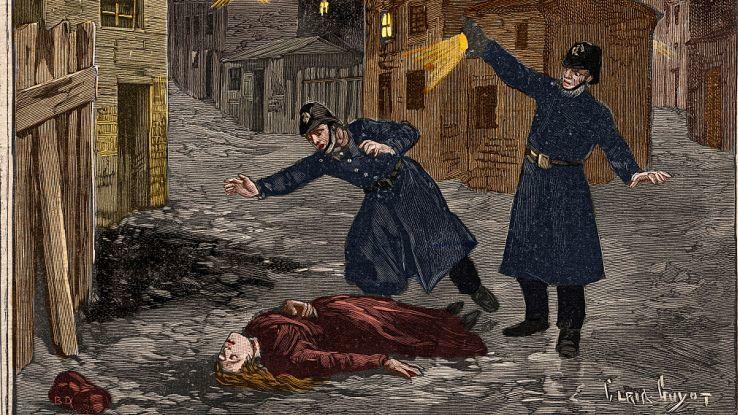
Who was Jack the Ripper? Police and amateur sleuths alike take tried for over a century to uncover the identity of the person responsible for the gruesome murders of Mary Ann Nichols, Annie Chapman, Elizabeth Step, Catherine Eddowes and Mary Jane Kelly.
The victims' bodies were slashed and their organs were carefully removed. It was believed the person responsible had grooming as a physician or a butcher. While the example remains unsolved, the following individuals are some of the near probable suspects.
Famous Painter Walter Sickert
Could acclaimed British artist Walter Sickert be Jack the Ripper? Sickert was a prominent painter whose piece of work depicted ordinary people and everyday life. While never linked to the murders during his lifetime, Sickert's proper name was first tied to the Ripper murders back in the 1970s.

After trying his manus at interim, Sickert went on to bring together the family tradition of fine art. Only Sickert broke from tradition by painting urban scenes rather than wealthy patrons' portraits. His work showed the transition from Impressionism to Modernism.
Sickert Painted the Murder of a Prostitute
As a fellow, Sickert studied under many influential artists, including Edgar Degas and James Abbott McNeill Whistler. Sickert's attraction to urban civilization was so intense that he oftentimes lived and worked in some of London'south grittier neighborhoods. Sickert'southward fine art oftentimes depicted trip the light fantastic hall girls and prostitutes.
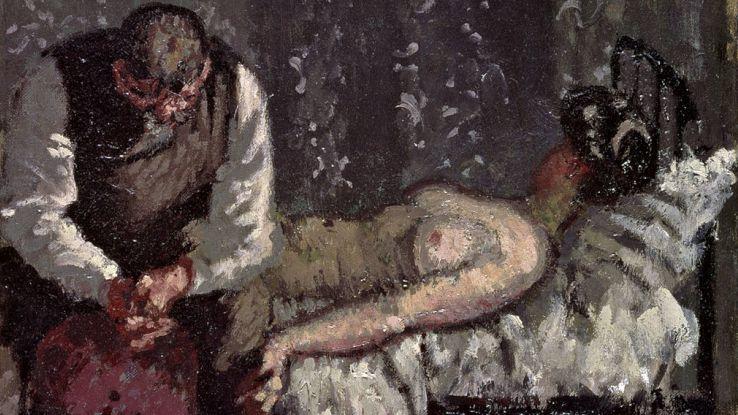
His fine art often had sexual themes that were considered vulgar and obscene. It'south believed that Sickert may have been a customer of some of the women who modeled for him. In 1907, he painted "The Camden Town Murder," a scene based on the grisly murder of a London prostitute whose throat was slit by her husband.
Sickert Painted "Jack the Ripper's Bedroom"
Sickert developed an interest in Jack the Ripper after his landlady told him she suspected her previous tenant was the murderer. Sickert's interest presently turned into fascination. He eventually painted the dark space and named the piece "Jack the Ripper's Bedroom."
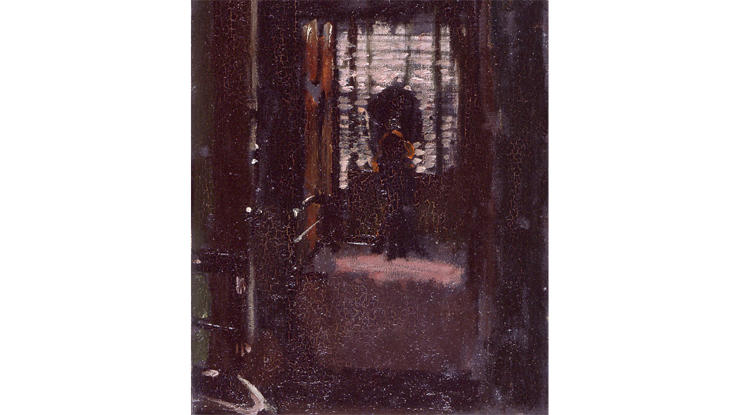
The work of art shows an ominous, shadowy room, as seen from the doorway, and leaves much to the imagination. The painting depicts a wooden chair and a dressing table and chair under a window with slightly opened blinds. The actual room was located at 6 Morning Crescent. The painting is on display at the Manchester Art Gallery.
Author Patricia Cornwell Believes Sickert Is the Leading Suspect
Some researchers pegged Sickert either every bit Jack the Ripper or his cohort. Merely the theory that Sickert was the killer heated upwardly in 2002 when best-selling law-breaking novelist Patricia Cornwell wrote "Portrait of a Killer: Jack the Ripper, Instance Closed," a nonfiction volume in which she put forth her theory that Sickert was the killer.

Cornwell contended that Sickert'due south paintings often portrayed themes of violence confronting women. She believes the motive for the murders was Sickert's alleged inability to have sex activity due to a bungled surgery on his penis. According to critics, Cornwell provided little prove that Sickert ever had such a surgery.
Cornwell May Have Cutting Upwardly One of Sickert's Paintings for Proof
Cornwell was then convinced that Walter Sickert was Jack the Ripper that she purchased 31 of his paintings, some of his letters and his writing desk in search of show to back up her theory. According to Cornwell, her investigation cost about $7 1000000.
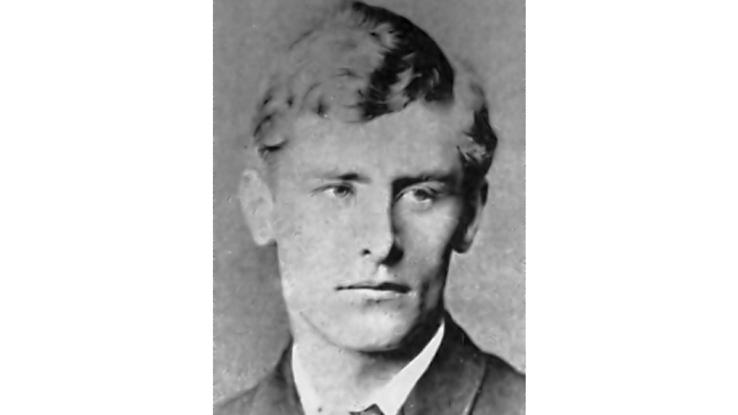
In 2001, The Guardian newspaper reported that Cornwell had cut up one of Sickert's paintings to obtain DNA or whatever other additional proof that the artist was truly the killer. The art world was shocked past Cornwell'due south behavior and called it an act of "monstrous stupidity." However, Cornwell has denied the allegation that any of Sickert's work was damaged.
Smooth Barber Aaron Kosminski
Smooth barber Aaron Kosminski has been repeatedly named equally a viable Jack the Ripper suspect. Later on the pogroms forced many Eastern European Jews to flee their homes, Kosminski and his siblings immigrated to Not bad Great britain from Poland. They ended up in the slums of Whitechapel, where Kosminski worked sporadically equally a barber.
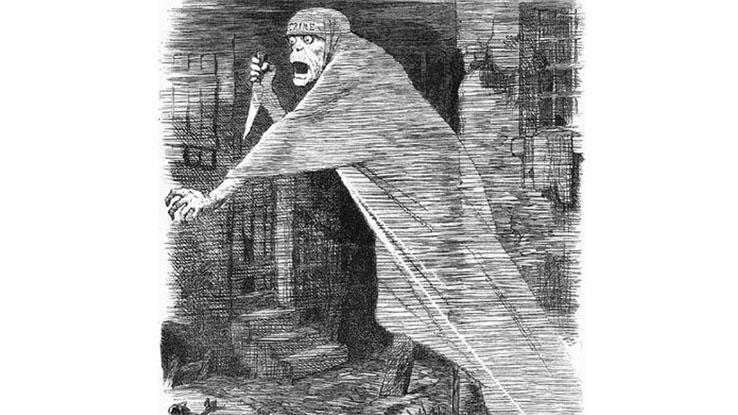
Banana Chief Lawman Sir Melville Macnaghten named Kosminski equally a prime number suspect. Co-ordinate to Macnaghten, Kosminski "had a great hatred of women…with potent homicidal tendencies." Kosminski was admitted to the Leavesden Asylum in 1894, but in that location were never whatsoever reports of him showing violence during his residency at the facility.
Kosminski Was a Paranoid Schizophrenic
Kosminski was thought to have suffered from paranoid schizophrenia. His symptoms included auditory hallucinations and an intense fear of accepting food from other people. Kosminski was and so fearful of food that was offered to him that he preferred to eat morsels that had dropped on the footing.

Kosminski spent most of his adult life in and out of insane asylums and public workhouses. At one point, the mentally unstable human being was committed later on threatening to kill his sister with a knife. He died in 1919 at the age of 53. At the time of his death, Kosminski weighed but 93 pounds.
Ripper Victim Catherine Eddowes' Shawl Was Analyzed for Deoxyribonucleic acid Evidence
In 2007, author Russell Edwards purchased the stained shawl of Ripper victim Catherine Eddowes. It's believed police constable Amos Simpson discovered the shawl when he arrived at the scene of the murder and kept it for unknown reasons. Hoping to solve the Ripper mystery, he gave it to Liverpool John Moores University biochemist Dr. Jari Louhelainen for Dna analysis.

In 2019, Louhelainen and reproduction expert David Miller submitted a paper to the Journal of Forensic Sciences that claimed they were able to excerpt mitochondrial Deoxyribonucleic acid from the shawl of Ripper victim Catherine Eddowes. DNA samples were also taken from Eddowes' and Kosminski's descendants.
Could Eddowes' Shawl Hold Ripper Clues?
The tests run by the two researchers compared fragments of mitochondrial DNA, that portion of DNA inherited from a person'due south mother. According to the researchers, The DNA was a positive lucifer to the sample provided by the living relative of Kosminski, which concluded the study that appeared in the Journal of Forensic Sciences.

Louhelainen claimed he was able to extract mitochondrial DNA from the silk shawl that was allegedly found adjacent to victim Catherine Eddowes. It was a 99.ii% match with the female line of Kosminski's sisters. The DNA besides showed that the sample came from someone with brown hair and brown eyes.
Skeptics Fence Louhelainen and Miller's Findings
Not everyone subscribes to the conclusions fabricated in Louhelainen and Miller's written report. Some scientists believe key details of the DNA were omitted, making the information difficult to verify. According to Louhelainen and Miller, the information was purposely omitted to protect the privacy of the Eddowes and Kosminski descendants.

Other Ripper researchers are highly doubtful that Aaron Kosminski was responsible for any of the Whitechapel murders, citing that the immigrant preferred speaking in Yiddish. With such poor English skills, it was highly unlikely Kosminski would have been able to lure any of the women into dark alleyways.
Was Jack the Ripper an American Ripper?
Could Jack the Ripper have actually been an American Ripper? H.H. Holmes was a doc who gained fame as America's first known serial killer. Born Herman Webster Mudgett, Holmes was a known con creative person and bigamist. Like Jack the Ripper, he was common cold and calculating and easily evaded detection.
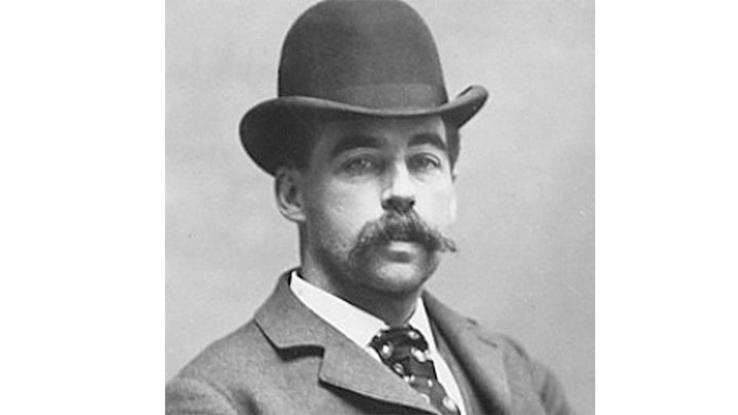
Attorney Jeff Mudgett believes that his great-great-granddaddy H.H. Holmes and Jack the Ripper are the same. Mudgett says that data contained in two diaries he inherited from Holmes reveals how his reprehensible relative murdered London prostitutes. Transport passenger logs bear witness that an H. Holmes traveled from London to the Us shortly after the murders stopped.
Holmes Said He'd Always Been Fascinated With Death
Holmes was born in 1861 to an affluent New Hampshire family. He claimed that he was bullied as a child and that schoolmates locked him into a closet with a skeleton. Rather than feeling horror, Holmes said he developed a fascination with decease.
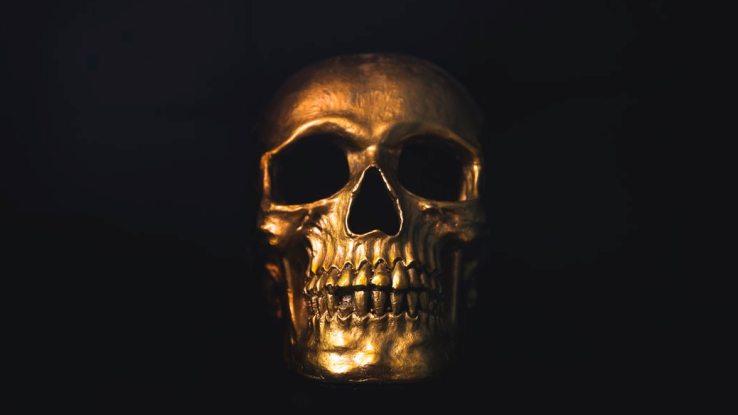
Mudgett married in 1878, and he and wife Clara had a son in 1880. In 1884 he graduated from the University of Michigan's Schoolhouse of Medicine, where he'd worked with cadavers as an assistant in the anatomy lab equally a medical educatee. Acquaintances recall Mudgett was abusive to Clara, who left him in 1884.
Holmes Congenital a "Murder Castle"
Following his graduation, Mudgett inverse his name and moved to Chicago after he was involved in several scams and his proper noun was linked to the disappearance of a lilliputian male child. In 1886, Holmes ready shop in Chicago as a chemist and began murdering people in social club to steal their belongings.
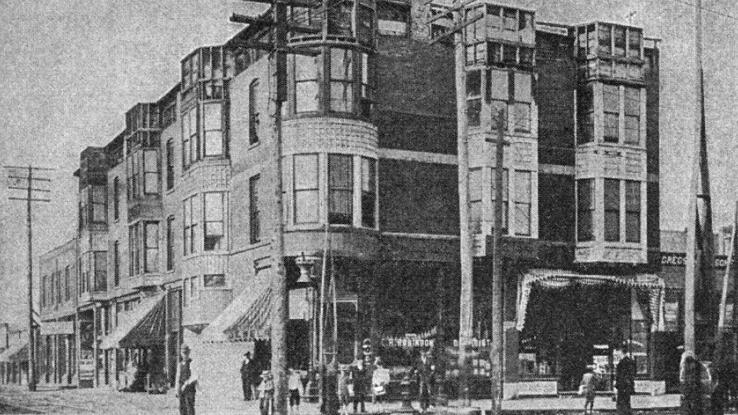
Holmes carried out the murders in a edifice he claimed would serve as a hotel for visitors attending the Globe's Columbian Exposition. But the building was actually designed for torture, executions and torso disposals. Later his arrest, investigators discovered hidden passageways and rooms synthetic with trap doors. The grisly revelation resulted in the building beingness nicknamed the "Murder Castle."
"I Was Born With the Devil in Me"
Holmes was eventually arrested, tried and convicted for the murder of his friend, Benjamin Pitezel. Pitezel had helped Holmes scam insurance companies, but he and his children were murdered when Holmes thought their deaths might bring in some money.

Holmes initially confessed to 27 murders, but the number somewhen rose to 130 and could exist every bit high as 200. Holmes began making numerous confessions, but information technology was hard for investigators to determine truth and fiction. In prison, Holmes wrote, "I was born with the devil in me." He likewise claimed that his appearance while in prison house was beginning to look like that of Satan.
Mudgett Insists Holmes Is Linked to the Ripper Murders
Holmes was hanged on May 7, 1896. Jeff Mudgett believes a lookalike was tricked into taking Holmes' place in prison. Although Holmes' body was discovered in a Pennsylvania grave, and Deoxyribonucleic acid has conclusively proven his identity, Mudgett insists Holmes is linked to the Jack the Ripper murders.
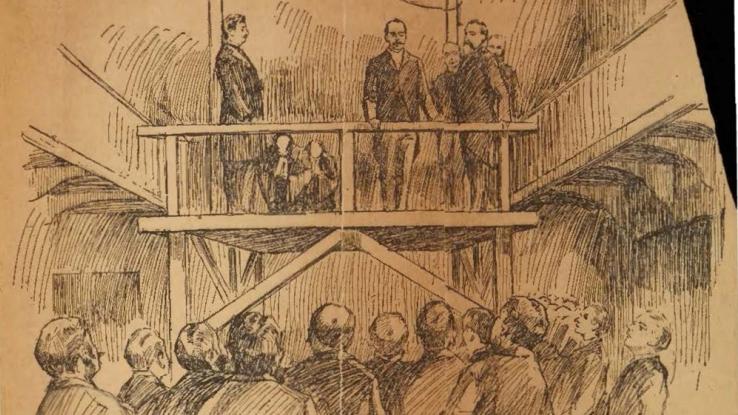
In an NBC 5 Chicago interview, Mudgett maintained that his relative is nonetheless a viable suspect, stating, "There are too many coincidences for this to exist another bogus theory. I know that the evidence is out there to show my theory and I'm not going to surrender until I find it."
Was the Lambeth Poisoner the True Ripper?
Thomas Neill Foam was a Scottish-Canadian physician-turned-serial killer who was known in the press every bit the "Lambeth Poisoner." Born in Scotland and raised virtually Quebec City, Foam received his medical degree from McGill University and did post-graduate training at St. Thomas' Hospital Medical School in London. His affinity for killing prostitutes fabricated him a probable suspect.
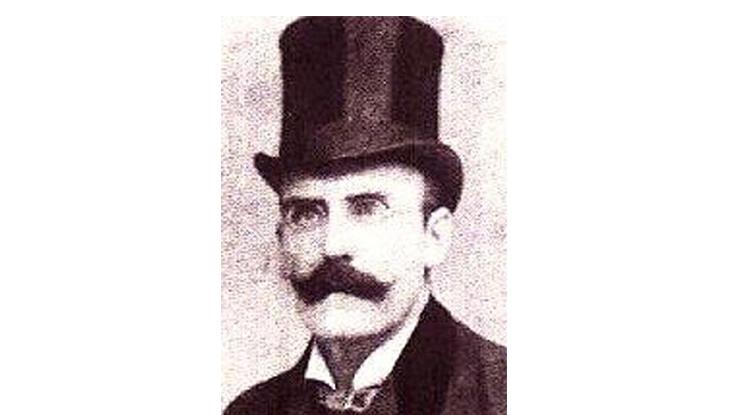
Cream had a shady past. In 1876, Cream had a relationship with a young lady named Flora Brooks that resulted in an unexpected pregnancy. Cream virtually killed Brooks when he attempted to abort the babe. At the insistence of her father, Cream married Brooks, and so he set off to England.
Foam Escaped Two Murder Convictions
Due to multiple run-ins with the law, Foam moved betwixt Canada, the United States and England, typically setting up shop equally an abortionist in seedy areas. After his return to Canada, the body of chambermaid Kate Gardener was found in Cream's office. Lying next to the body was a bottle of chloroform. Despite the unusual circumstances and Cream's nefarious background, Cream was not charged with murder.
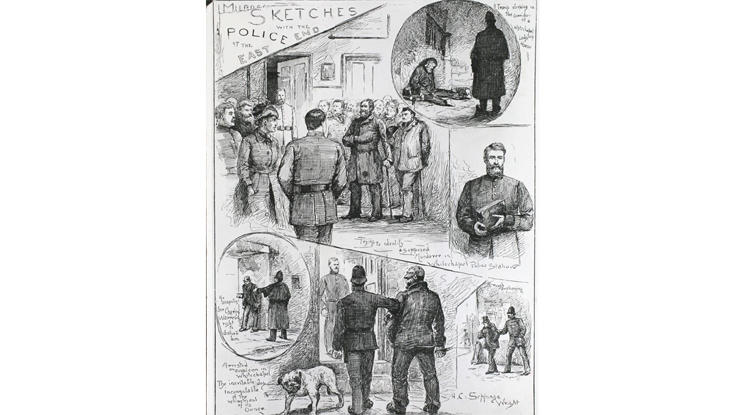
After Gardener'southward death, Cream headed off to Chicago. In August of 1880, a woman past the name of Julia Faulkner, who'd been associated with Foam, also died under unexplained circumstances. Cream was arrested but escaped formal charges.
Cream Begins Selling Poisonous Potions
In 1891, Cream began selling strychnine "medicines" to prostitutes, claiming they prevented venereal diseases and cured epilepsy. Foam also added strychnine to a potion that killed Daniel Stott, a patient who learned Cream was having an affair with his wife. Investigators discovered Stott had been poisoned and sent Foam off to the Illinois Country Penitentiary.
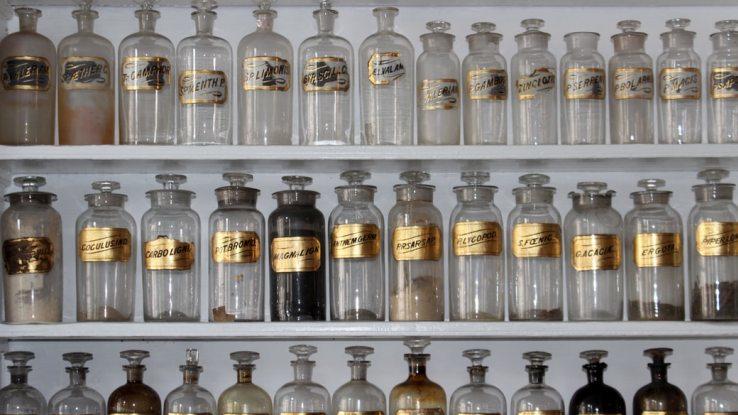
Cream was sentenced to life in prison only was released for good behavior in 1891. He traveled to Canada, so set up off for England. Within days, prostitutes Ellen "Nellie" Donworth, 18, and Matilda Clover, 27, died afterward consuming Cream'due south concoctions. Cream too killed prostitutes Alice Marsh, 21, and Emma Shrivell, eighteen, subsequently lacing their drinks with strychnine.
Cream Attempted to Extort Money After the Murders
In addition to working every bit an abortionist and poisoner, Cream also became an accomplished extortionist. When a prostitute died, Foam would then accuse a prominent human being of the murders and endeavour blackmail. Cream tried to blackmail his neighbor, Joseph Harper, challenge he had evidence that the human had killed Marsh and Shrivell. He told Harper that a sum of £1,500 could make the unfortunate allegation go away.
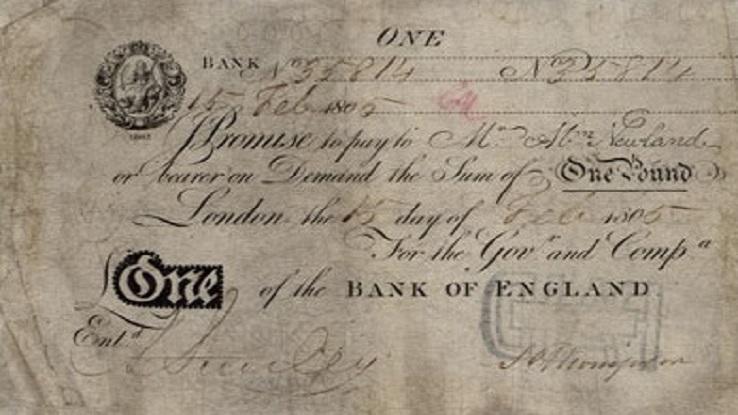
Harper refused to cavern to Cream's demands. The police were eventually able to tie the doctor to the murders when Scotland 1000 surveilled Cream and learned that he frequently met with prostitutes.
Cream'south Punishment
Foam was convicted of murdering Matilda Clover and hanged in 1892 at the age of 42. According to executioner James Billington, Cream'due south last words on the scaffold before his death were "I am Jack the…." Billington reported that this was Cream's confession, revealing his identity equally Jack the Ripper.
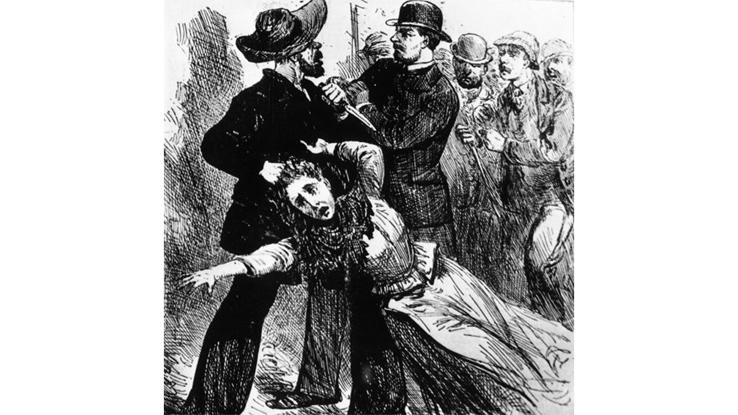
While records prove Cream had been in prison house during the Ripper murders, some researchers speculate that the prison house where he was held was then decadent that he may accept bribed prison officials in order to proceeds an early release and that the remainder of his term was served by a lookalike.
Was the Ripper a Royal?
One of the near sensational suspects is Queen Victoria'southward grandson, Prince Albert Victor. Known fondly as "Boil," the prince was the son of Prince Edward and Princess Alexandra. When his father became king, Albert Victor became second in line to the British throne. Simply the prince never had the take a chance to become king, dying at the age of 28 from influenza during the 1891 pandemic.
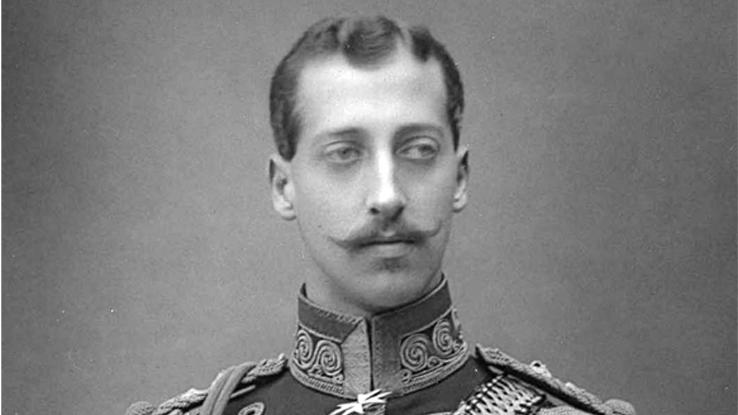
During his brief life, Albert Victor'southward sexuality and mental health were subjects of bully speculation. He was rumored to take been associated with a homosexual brothel. The rumors and scandal were a abiding source of embarrassment to the prince and royal family.
Prince Albert Victor
In 1970, British physician Thomas Stowell wrote an commodity that accused the prince of being the infamous murderer. Co-ordinate to Stowell, the prince'due south Jack the Ripper alter ego committed the murders during bouts of temporary insanity caused by an advanced case of syphilis.
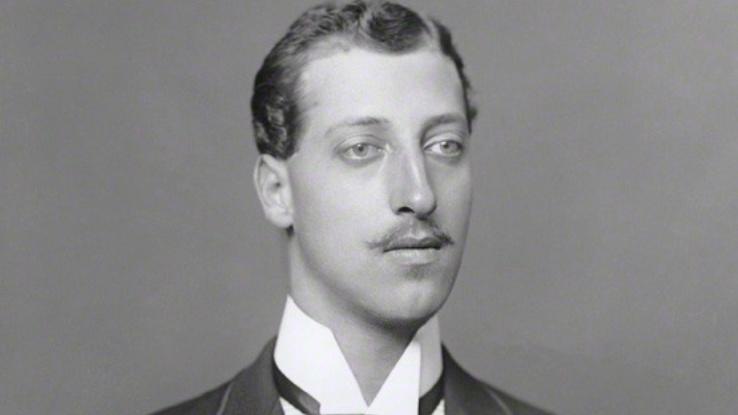
Stowell claims he adult his theory after seeing the private papers of royal doc Sir William Gull. In his writings, Gull referred to the Ripper just as "S" but also described him every bit being a gentleman of "collars and cuffs," a nickname for the well-dressed prince, who often wore starched collars to hide his unusually long neck.
Were the Murders an Deed of Revenge?
Ripperologists who hold with Stowell believe the prince may have been exacting revenge on prostitutes. Rumors swirled that he'd contracted syphilis from an illicit encounter while at sea with the Royal Navy in the Caribbean. Nonetheless, the stories of his illness take never been verified.
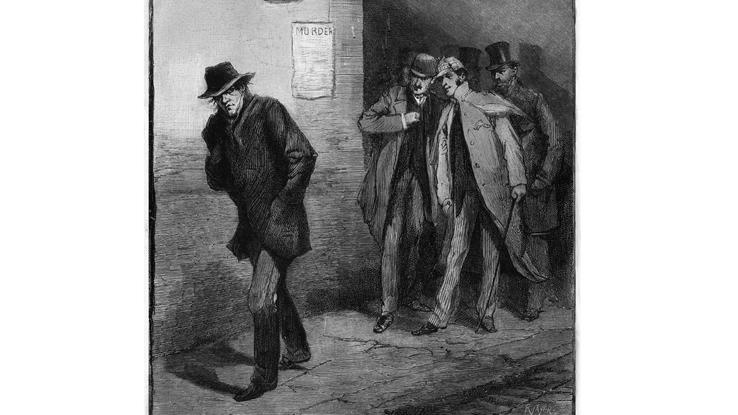
"The killer was a gentleman who had contracted syphilis in his youth, and now in the final stages of the illness suffered delusions," writes author Christopher J. Morley. "He became sadistically aroused when watching deer beingness dressed, and when his warped sexual passion exploded committed the murders. He was assisted by the government who helped to conceal it from the public."
Did the Royal Family Hide Albert Victor's Violence?
Stowell declared that later the second Whitechapel murder, the purple family was certain that Eddy was really Jack the Ripper, just they needed to go on his violence and illness a underground. Stowell claims that his violent behavior was curtained from the public when the royal family had him committed to a private mental hospital in Sandringham.
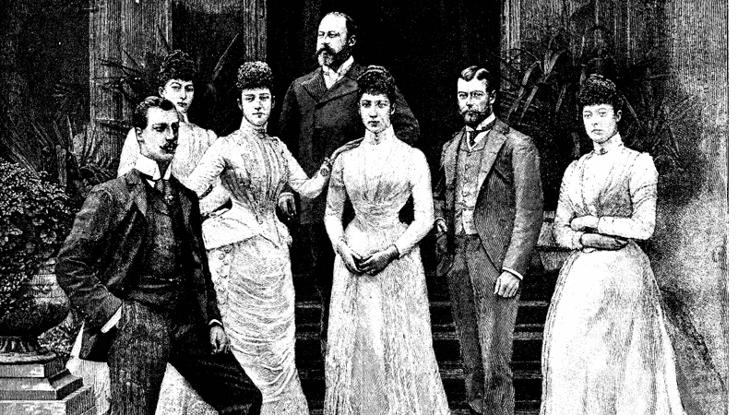
Stowell asserts that Boil'southward true cause of decease was from syphilis and not a flu as the family had claimed. Stowell as well states that when the family realized Albert Victor was not a suitable candidate for king, the prince was poisoned after existence given a fatal dose of morphine.
Did the Murders Embrace Up a Regal Hole-and-corner?
A 2nd theory hypothesized that the murders covered up a underground spousal relationship betwixt the prince and a local woman. In the volume "Prince Jack" by Frederick Spiering, the prince had fallen in love with a commoner by the name of Elizabeth Crook, and the 2 married and had a child. In addition to her lowly station in life, Crook was as well a Catholic.
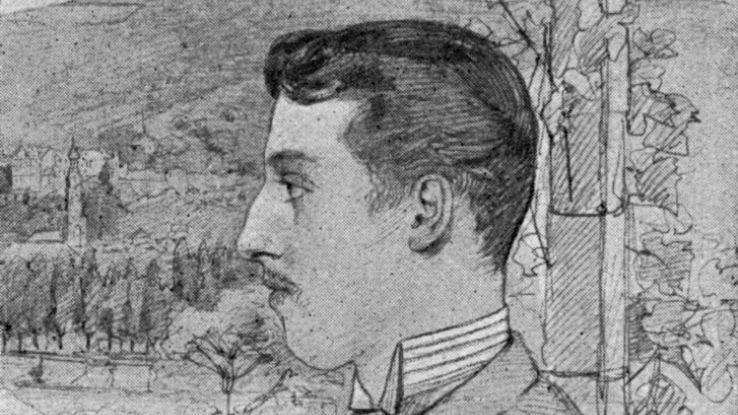
Their matrimony would accept been considered a family disgrace. According to Spiering, the imperial family unit plotted to murder anyone with cognition of the human relationship. While the theory of the Prince as Ripper is intriguing, there'due south nil more than than circumstantial testify linking the prince to the murders.
Was Jack the Ripper a Woman?
Could Jack the Ripper have been Jill the Ripper? Some Ripperologists developed the theory subsequently a murder in 1890 was committed past a woman named Mary Pearcey. Pearcey invited friend Phoebe Hogg to visit her dwelling and brutally murdered Hogg and her infant. It'southward believed Pearcey was having an affair with Hogg's hubby when she decided to murder the woman and child.

On October 24, 1890, Pearcey'due south neighbors heard screams coming from her habitation. That evening, Hogg's horribly mutilated body was discovered. A bloodsoaked baby carriage was found about a mile away, with Hogg'southward baby Tiggy nearby. Witnesses said they had seen Pearcey pushing the buggy.
Pearcey Seemed Unconcerned When Police Searched Her Blood-spattered Habitation
Like Jack the Ripper's victims, police discovered the bodies of Hogg and her babe had been savagely attacked and dumped. When investigators went to question Pearcey, they found her dwelling was spattered with claret. Upon asking for an explanation, Pearcey replied, "Killing mice, killing mice, killing mice."
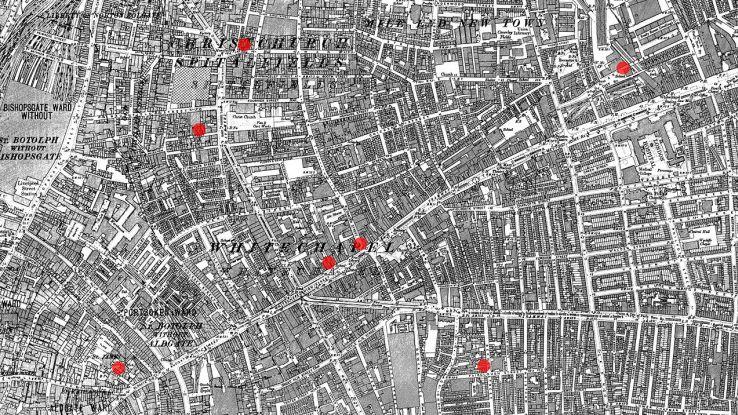
When authorities searched her home they plant bloodstains in the kitchen, along with a bloodstained poker and a carving pocketknife. In that location were also two broken windows in the kitchen, indicating signs of a struggle. When Pearcey was arrested, constabulary found blood on her habiliment, and she was wearing Hogg'southward wedding ring.
The Pearcey Murders Had Similarities to the Ripper Killings
According to some Ripperologists, Hogg'southward vicious murder shared similarities with the horrific Whitechapel killings. Phoebe Hogg and the Whitechapel prostitutes died from slashes to the throat, and all had their bodies dumped in public places.
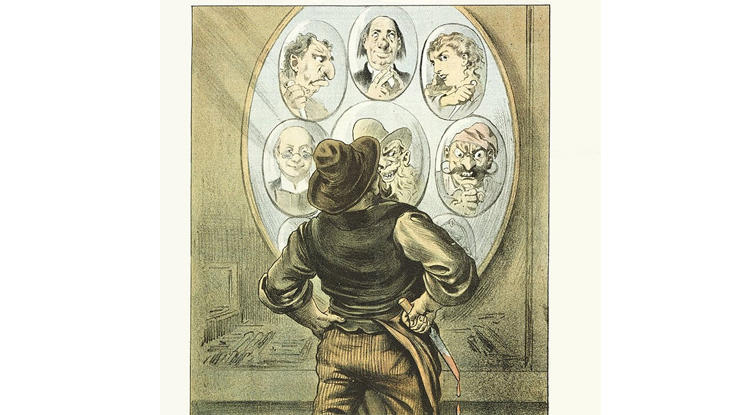
Pearcey was hanged in 1890. Ripper investigator Sir Melville Macnaghten witnessed Pearcey's execution and wrote, "I accept never seen a adult female of stronger physique… Her nerves were as iron cast as her body." Executioner James Drupe gave a similar account of Pearcey's demeanor. Prior to her death, Pearcey placed a cryptic ad that read, "mecp last wish of mew, have not betrayed mew," but refused to reveal its meaning.
Pearcey Never Confessed to Whatsoever Crimes
According to those present at her execution, Pearcey's final words were, "My sentence is a just one, but a good bargain of the show against me was false." Pearcey was so infamous that Madame Tussaud'south Wax Museum created a likeness of her that attracted xxx,000 curious visitors. The noose used to hang Pearcey can be found at the Black Museum of Scotland Yard.
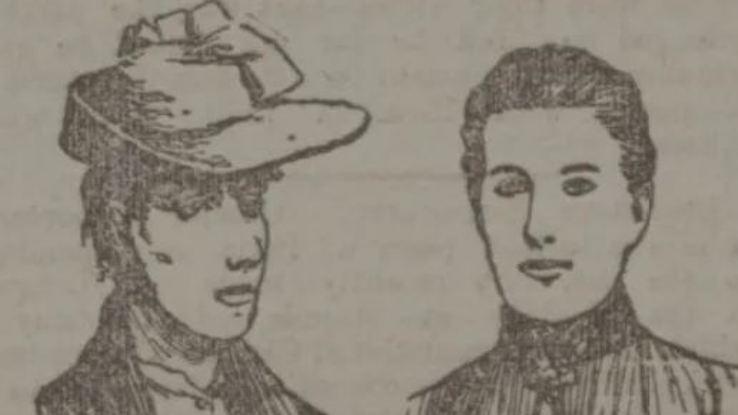
Present-day Jack the Ripper scholars believe Pearcey may accept suffered from a personality disorder exacerbated by alcoholism and depression. Pearcey's attorney attempted to prove that she was mentally ill. However, an exam past three doctors failed to find whatever medical bug.
"Jill the Ripper" Could Have Been a Midwife…or a Man
After Pearcey's trial, some investigators theorized that Jack the Ripper may accept been a human dressed as a woman. At the time of the murders, information technology was common for midwives to evangelize babies and sometimes perform abortions. Their blood-stained wearable typically went unnoticed by area residents.
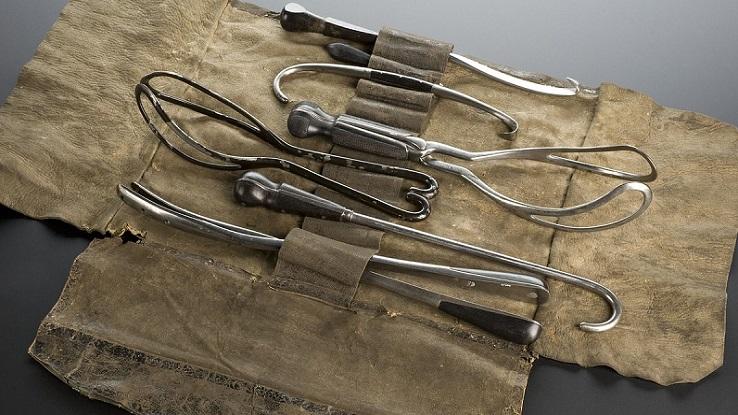
An impostor dressed as a adult female walking late at dark would likely be ignored. Writer Sir Arthur Conan Doyle subscribed to this theory. Another theory involved a "mad midwife" who was either disgruntled or deranged. Similar doctors, midwives were also familiar with the female anatomy and even knew nigh certain pressure points that could return a woman unconscious.
hudsonstolven1993.blogspot.com
Source: https://www.faqtoids.com/knowledge/jack-the-ripper-suspects?utm_content=params%3Ao%3D740006%26ad%3DdirN%26qo%3DserpIndex
0 Response to "You Got Black Jack Do It Again"
Post a Comment